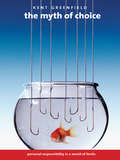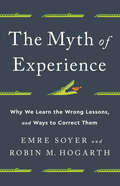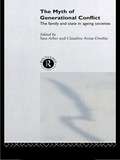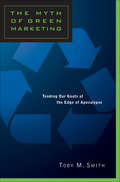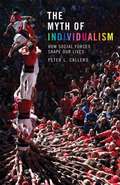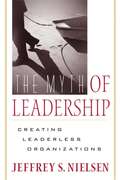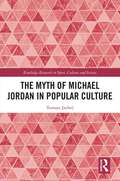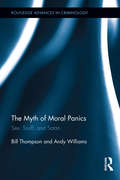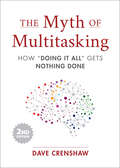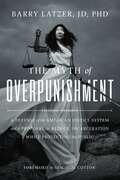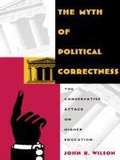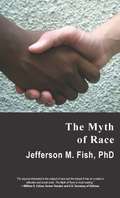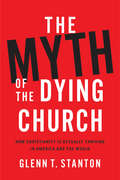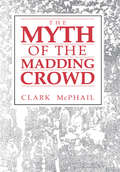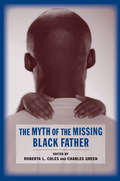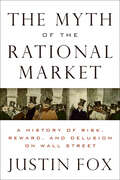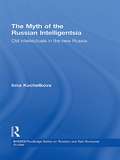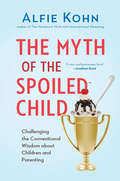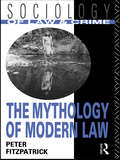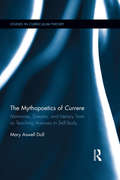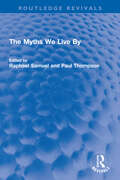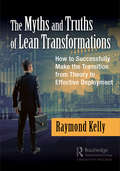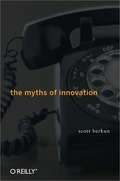- Table View
- List View
The Myth of Choice
by Kent GreenfieldAmericans are fixated on the idea of choice. Our political theory is based on the consent of the governed. Our legal system is built upon the argument that people freely make choices and bear responsibility for them. And what slogan could better express the heart of our consumer culture than "Have it your way"? In this provocative book, Kent Greenfield poses unsettling questions about the choices we make. What if they are more constrained and limited than we like to think? If we have less free will than we realize, what are the implications for us as individuals and for our society? To uncover the answers, Greenfield taps into scholarship on topics ranging from brain science to economics, political theory to sociology. His discoveries--told through an entertaining array of news events, personal anecdotes, crime stories, and legal decisions--confirm that many factors, conscious and unconscious, limit our free will. Worse, by failing to perceive them we leave ourselves open to manipulation. But Greenfield offers useful suggestions to help us become better decision makers as individuals, and to ensure that in our laws and public policy we acknowledge the complexity of choice.
The Myth of Experience: Why We Learn the Wrong Lessons, and Ways to Correct Them
by Emre Soyer Robin M HogarthExperience is a great teacher-except when it isn't.Our personal experience is key to who we are and what we do. We judge others by their experience and are judged by ours. Society venerates experience. From doctors to teachers to managers to presidents, the more experience the better. It's not surprising then, that we often fall back on experience when making decisions, an easy way to make judgements about the future, a constant teacher that provides clear lessons. Yet, this intuitive reliance on experience is misplaced.In The Myth of Experience, behavioral scientists Emre Soyer and Robin Hogarth take a transformative look at experience and the many ways it deceives and misleads us. From distorting the past to limiting creativity to reducing happiness, experience can cause misperceptions and then reinforce them without our awareness. Instead, the authors argue for a nuanced approach, where a healthy skepticism toward the lessons of experience results in more reliable decisions and sustainable growth.Soyer and Hogarth illustrate the flaws of experience--with real-life examples from bloodletting to personal computers to pandemics--and distill cutting-edge research as a guide to decision-making, as well as provide the remedies needed to improve our judgments and choices in the workplace and beyond.
The Myth of Generational Conflict: The Family and State in Ageing Societies (Studies in European Sociology)
by Claudine Attias-Donfut Sara ArberThe ageing of Western societies has provoked extensive sociological debate, surrounding both the role of the state and whether it can afford the cost of an ageing population, and the role of the family, especially women, in supporting older people. In this important book, the authors examine how changes, such as cuts in welfare provision, migration, urbanization and individualisation influence intergenerational relations. The collection addresses theoretical and policy issues connecting age and generation with the family and social policy, and focuses both on cross-cultural comparison within societies and analysis based on a range of societies. This edited collection brings together a range of leading researchers and theorists from across Europe to advance a sociological understanding of generational relations, in terms of the state and the family and how they are interlinked. It will be of interest to academics and researchers in sociology, social policy and ageing, and to policy makers concerned with the implications of demographic and policy changes.
The Myth of Green Marketing
by Toby SmithIn this groundbreaking study, Toby Smith analyses the role that social myths such as green marketing play in public understanding of the environmental crisis. This book introduces the concept of hegemony into environmental politics, using the concept to elucidate the political, economic, and social alliance that sustains our belief in industrial expansionism. The ecological crisis of the late twentieth century presents a challenge to the very foundations of this alliance. The hegemonic system reacts to a threat to its structure by producing social myths that provide a common sense understanding of the threat. Smith examines one such social myth, the contemporary phenomenon known as green marketing, and how it came to reinforce, rather than challenge, the ethics of productivism. By analysing green marketing as it relates primarily to the early 1990s corporate campaigns of companies such as McDonald's, Shell Chemicals, and Mobil Chemical Co., Smith demonstrates how these voices weave together an understanding of green consumerism using familiar language from economic and liberal democratic discourses. The Myth of Green Marketing is an original and important contribution to the field of environmental studies. As the first book on green marketing, it is sure to raise controversy with its unique discussion of the cultural and social aspects of environmental issues.
The Myth of Indigenous Caribbean Extinction: Continuity and Reclamation in Borikén (Puerto Rico)
by T. CastanhaThis book debunks one of the greatest myths ever told in Caribbean history: that the indigenous peoples who encountered a very lost Christopher Columbus are 'extinct.' Through the uncovering of recent ethnographical data, the author reveals extensive narratives of Jíbaro Indian resistance and cultural continuity on the island of Borikén.
The Myth of Individualism: How Social Forces Shape Our Lives
by Peter L. CalleroDespite some popular arguments to the contrary, Americans are like people everywhere: naturally social, interdependent, and shaped by social forces. The Myth of Individualism offers a concise introduction to sociology and sociological thinking. Callero challenges the dominant belief that human behavior is the result of free choices made by autonomous actors. Drawing upon personal stories, historical events, and sociological research, Callero offers an informative outlook on enduring social problems that can help us begin the process of developing a sociological perspective. By acknowledging the limits of individual effort and control, we gain insight into our own lives and the lives of others. Callero engagingly examines the fundamental importance of cultural symbols, the pressures of group conformity, the influence of family, the impact of social class, the wide reach of global capitalism, and the revolutionary potential of collective action. The second edition is updated throughout, including new examples from the recent financial crisis and the Arab Spring. It also includes a new chapter on the power of mass media and how media influences our lives. The Myth of Individualism is a must-read for anyone interested in how powerful social forces shape individual lives in subtle but compelling ways.
The Myth of Leadership: Creating Leaderless Organizations
by Jeffrey S. NielsenWhen we join an organization, we're immediately slotted into a hierarchy based on a rank-based system of "leaders" and "followers." We then make false assumptions about our place in these hierarchies that divide our efforts, limit our growth opportunities and rob us of meaningful, dignified work. These assumptions are what Jeffrey Nielsen calls the "myth of leadership." In this unconventional book, Nielsen calls for an end to "rank-based" organizational structures, which foster secrecy and miscommunication and steal the joy from work, while breeding corruption and abuse of power. Nielsen's new model is the "peer-based" organization, which uses rotating peer leadership councils and crossfunctional task forces to manage the organization's work. These new entities are better suited to making decisions based on the organization's competencies and customer needs, rather than on static functional groups or other artificial divisions. Nielsen's experience with dozens of organizations showed that while workers were universally motivated to make their organizations profitable, artificial barriers consistently prevented them from reaching their potential. Real-world examples from contemporary peerbased organizations help make his point for creating leaderless organizations.
The Myth of Michael Jordan in Popular Culture (Routledge Research in Sport, Culture and Society)
by Tomasz JachećThis book examines the life and career of Michael Jordan, one of the greatest athletes in the history of sports, asking how he transcended his sport to become a canonical myth in popular culture.Drawing on work in sport studies, cultural studies, sociology, history, business, and media, this book helps us to understand how myths are made in modern society and highlights the importance of myths in a ‘post‑truth’ world. It unpacks the underlying ‘monomythical’ structure of the Jordan myth, including the universality of the ‘hero’s journey’, and explores those features that are inherently American but that also carried Jordan to the status of a global superstar. This book traces the contours of his career and looks at how the intersection of commercial interests, media narratives, and supreme athletic talent, in a particular social, political, and historical context, generated a myth that continues to resonate today, long after the end of Jordan’s playing career.Drawing on original research and adding new theoretical depth to our understanding of Michael Jordan’s place in popular culture, this book is essential reading for anybody with an interest in the relationship between sport and wider society.
The Myth of Moral Panics: Sex, Snuff, and Satan (Routledge Advances in Criminology #14)
by Andy Williams Bill ThompsonThis study provides a comprehensive critique - forensic, historical, and theoretical - of the moral panic paradigm, using empirically grounded ethnographic research to argue that the panic paradigm suffers from fundamental flaws that make it a myth rather than a viable academic perspective.
The Myth of Multitasking: How "Doing It All" Gets Nothing Done
by Dave CrenshawThrough anecdotal and real-world examples, learn how multitasking hurts your focus and productivity and how doing one thing at a time is more effective.“Remember this rule: the more responsibility you have, the more hats you wear, the more likely you are to become inefficient.”In a compelling business fable, The Myth of Multitasking confronts a popular idea that has come to define our hectic, work-a-day world. This simple yet powerful book shows clearly why multitasking is, in fact, a lie that wastes time and costs money. Far from being efficient, multitasking actually damages productivity and relationships at work and at home.In his groundbreaking book, management expert Dave Crenshaw offers clear solutions for dealing with today’s information-saturated world. He shows what to do when interrupted by co-workers and how to deal with distracting electronic communications such as e-mail and phone messages. Written with wit and a healthy dose of wisdom, The Myth of Multitasking helps business leaders and employees:Recognize why multitasking is a false constructUnderstand the difference between background-tasking and switch taskingCreate a new and realistic weekly budget for using timeSchedule recurring appointments with key peopleFor anyone who has difficulty focusing on the task at hand or paying attention to others when they are speaking, The Myth of Multitasking is an invaluable resource.
The Myth of Overpunishment: A Defense Of The American Justice System And A Proposal To Reduce Incarceration While Protecting The Public
by Barry LatzerJustice is on trial in the United States. From police to prisons, the justice system is accused of overpunishing. It is said that too many Americans are abused by the police, arrested, jailed, and imprisoned. But the denunciations are overblown. The data indicate, contrary to the critics, that we don’t imprison too many, nor do we overpunish. This becomes evident when we examine the crimes of prisoners and the actual time served. The Myth of Overpunishment is a defense of our incarceration system. The history of punishment in the United States, discussed in vivid detail, reveals that the treatment of offenders has become progressively more lenient. Corporal punishment is no more. The death penalty has become a rarity. Many convicted defendants are given no-incarceration sentences. Restorative justice may be a good thing for low-level offenses, or as an add-on for remorseful prisoners. But when it comes to major crimes it is no substitute for punitive justice. The Myth of Overpunishment presents a workable and politically feasible plan to electronically monitor arrested suspects prior to adjudication (bail reform), defendants placed on probation, and parolees.
The Myth of Political Correctness: The Conservative Attack on Higher Education
by John K. WilsonThe classics of Western culture are out, not being taught, replaced by second-rate and Third World texts. White males are a victimized minority on campuses across the country, thanks to affirmative action. Speech codes have silenced anyone who won't toe the liberal line. Feminists, wielding their brand of sexual correctness, have taken over. These are among the prevalent myths about higher education that John K. Wilson explodes.The phrase "political correctness" is on everyone's lips, on radio and television, and in newspapers and magazines. The phenomenon itself, however, has been deceptively described. Wilson steps into the nation's favorite cultural fray to reveal that many of the most widely publicized anecdotes about PC are in fact more myth than reality. Based on his own experience as a student and in-depth research, he shows what's really going on beneath the hysteria and alarmism about political correctness and finds that the most disturbing examples of thought policing on campus have come from the right. The image of the college campus as a gulag of left-wing totalitarianism is false, argues Wilson, created largely through the exaggeration of deceptive stories by conservatives who hypocritically seek to silence their political opponents.Many of today's most controversial topics are here: multiculturalism, reverse discrimination, speech codes, date rape, and sexual harassment. So are the well-recognized protagonists in the debate: Dinesh D'Souza, William Bennett, and Lynne Cheney, among others. In lively fashion and in meticulous detail, Wilson compares fact to fiction and lays one myth after another to rest, revealing the double standard that allows "conservative correctness" on college campuses to go unchallenged.
The Myth of Race
by Jefferson M. FishThe Myth of Race deals concisely with a wide range of topics, from how the concept of race differs in different cultures and race relations in the United States, to IQ tests and the census. It draws on scientific knowledge to topple a series of myths that pass as facts, correct false assumptions, and clarify cultural misunderstandings about the highly charged topic of race.The book demonstrates that the apparently straightforward concept of race is actually a confused mixture of two different concepts; and the confusion often leads to miscommunication. The first concept, biological race, simply doesn't exist in the human species. Instead, what exists is gradual variation in what people look like (e.g., skin color and facial features) and in their genes, as you travel around the planet--with more distant populations appearing more different than closer ones. If you travel in different directions, the populations look different in different ways. The second concept, social race, is a set of cultural categories for labeling people based on how their ancestors were classified, selected aspects of what they look like, or various combinations of both. These sets of categories vary widely from one culture to another.
The Myth of the Dying Church: How Christianity Is Actually Thriving in America and the World
by Glenn T. StantonStop believing the false narrative that Christianity is declining, and discover the truth about the health of the church in America and around the world.Much has been made of the so-called "nones" - those who claim no spiritual affiliation. Media has spun the nones into a chicken-little the sky is falling narrative. The nones are an infamously difficult subsection to understand and there is a lot of false information on them. Glenn Stanton believes the nones story has become overblown and has become "a thing" due to curiosity and repetition of their supposed irreligiosity. THE MYTH OF THE DYING CHURCH digs deeply into the research concerning spirituality in America and reveals the hope and truth about the vitality and future of the church.
The Myth of the Madding Crowd (Social Institutions And Social Change Ser.)
by Clark McPhailCrowd behavior is one of the most colorful but least understood forms of human social behavior. This volume is a major contribution to the field of collective behavior, with implications for social movement analysis.McPhail's critical assessment of the major theories of crowd behavior establishes that, whatever their particular limitations and strengths, all share a general and serious flaw: their explanations were developed without prior examination of the behaviors to be explained. Drawing on a wide range of empirical studies that include his own careful field work, the author offers a new characterization of temporary gatherings. He presents a life cycle of gatherings and a taxonomy of forms of collective behavior within gatherings, as well as combinations of these forms and gatherings into larger events, campaigns and waves. McPhail also develops a new explanation for various ways in which purposive actors construct collective actions.
The Myth of the Missing Black Father
by Charles Green Roberta ColesCommon stereotypes portray black fathers as being largely absent from their families. Yet while black fathers are less likely than white and Hispanic fathers to marry their child's mother, many continue to parent through cohabitation and visitation, providing caretaking, financial, and other in-kind support. This volume captures the meaning and practice of black fatherhood in its many manifestations, exploring two-parent families, cohabitation, single custodial fathering, stepfathering, noncustodial visitation, and parenting by extended family members and friends. Contributors examine ways that black men perceive and decipher their parenting responsibilities, paying careful attention to psychosocial, economic, and political factors that affect the ability to parent. Chapters compare the diversity of African American fatherhood with negative portrayals in politics, academia, and literature and, through qualitative analysis and original profiles, illustrate the struggle and intent of many black fathers to be responsible caregivers. This collection also includes interviews with daughters of absent fathers and concludes with the effects of certain policy decisions on responsible parenting.
The Myth of the Rational Market: A History of Risk, Reward, and Delusion on Wall Street
by Justin FoxA New York Times Bestseller and Notable Book: “A rich history of the world’s most seductive investing idea.” —BloombergA Library Journal Best Business Book of the YearA lively history of ideas, The Myth of the Rational Market by former Time magazine economics columnist Justin Fox describes with insight and wit the rise and fall of the world’s most influential investing idea: the efficient markets theory. Longlisted for the Financial Times Business Book of the Year Award, The Myth of the Rational Market carries readers from the earliest days of Wall Street to the global financial crisis and Great Recession, debunking the long-held myth that the stock market is always right in the process while intelligently exploring the replacement theory of behavioral economics.“A fascinating historical narrative, beginning with economist Irving Fisher’s paean to markets in, alas, 1929.” —Roger Lowenstein, The Washington Post“Brilliantly tells the story of how [the finance industry’s] edifice was built—and why so few were willing to acknowledge that it was a house built on sand.” —Paul Krugman, The New York Times Book Review“His analysis is singularly compelling and the rare business history that reads like a thriller . . . A must-read for anyone interested in the markets, our economy or government.” —Publishers Weekly (starred review)“A valuable and highly readable history of risk and reward.” —Burton Malkiel, The Wall Street Journal
The Myth of the Russian Intelligentsia: Old Intellectuals in the New Russia (BASEES/Routledge Series on Russian and East European Studies)
by Inna KochetkovaRussia is one of the few countries in the world where intellectuals existed as a social group and shared a unique social identity. This book focuses on one of the most important and influential groups of Russian intellectuals - the 1960s generation of shestidesyatniki - often considered the last embodiment of the classical tradition of the intelligentsia. They devoted their lives to defending 'socialism with a human face', authored Perestroika, and were subsequently demonised when the reforms failed. It investigates how these intellectuals were affected by the transition to the new post-Soviet Russia, and how they responded to the criticism. Unlike other studies on this subject, which view the Russian intelligentsia as simply an objectively existing group, this book portrays the intelligentsia as a cultural story or myth, revealing that the intelligentsia's existence is a function of the intellectuals' abilities to construct moral arguments. Drawing from extensive original empirical research, including life-story interviews with the Russian intellectuals, it shows how the shestidesyatniki creatively mobilised the myth as they attempted to repair their damaged public image.
The Myth of the Spoiled Child: Challenging the Conventional Wisdom about Children and Parenting
by Alfie KohnSomehow, a set of deeply conservative assumptions about children--what they're like and how they should be raised--have congealed into the conventional wisdom in our society. Parents are accused of being both permissive and overprotective, unwilling to set limits and afraid to let their kids fail. Young people, meanwhile, are routinely described as entitled and narcissistic...among other unflattering adjectives.In The Myth of the Spoiled Child, Alfie Kohn systematically debunks these beliefs--not only challenging erroneous factual claims but also exposing the troubling ideology that underlies them. Complaints about pushover parents and coddled kids are hardly new, he shows, and there is no evidence that either phenomenon is especially widespread today--let alone more common than in previous generations. Moreover, new research reveals that helicopter parenting is quite rare and, surprisingly, may do more good than harm when it does occur. The major threat to healthy child development, John argues, is posed by parenting that is too controlling rather than too indulgent.With the same lively, contrarian style that marked his influential books about rewards, competition, and education, Kohn relies on a vast collection of social science data, as well as on logic and humor, to challenge assertions that appear with numbing regularity in the popular press. These include claims that young people suffer from inflated self-esteem; that they receive trophies, praise, and As too easily; and that they would benefit from more self-discipline and "grit." These conservative beliefs are often accepted without question, even by people who are politically liberal. Kohn's invitation to reexamine our assumptions is particularly timely, then; his book has the potential to change our culture's conversation about kids and the people who raise them.
The Mythological State and its Empire (Routledge Studies in Social and Political Thought)
by David GrantWe see the modern State as the most rational form of governing yet devised, and one which properly recognises our inherent individual rights. However, as the histories of colonialism and imprisonment reveal, it is also an intruder into the lives of generally unwilling individuals, constraining rights. This book looks beneath the contradiction to see an entity willingly sustained by all individuals and for which we forgo our responsibility to and for ourselves. We place ourselves in the hands of those interests that promise to deal with our fears and desires the best. Probing the work of political thinkers from Hobbes to Rawls, the book discovers a State that is a real, mythological entity, spreading across social and geographic space and concerned first with satisfying our two passions. Understanding this mythology may allow reason to emerge from its service to fear and desire, so that the modern State could become truly modern. This book will be of interest to scholars in Sociology, Politics, Philosophy, and Law.
The Mythology of Modern Law (Sociology of Law and Crime)
by Peter FitzpatrickThe Mythology of Modern Law is a radical reappraisal of the role of myth in modern society. Peter Fitzpatrick uses the example of law, as an integral category of modern social thought, to challenge the claims of modernity which deny the relevance of myth to modern society.
The Mythopoetics of Currere: Memories, Dreams, and Literary Texts as Teaching Avenues to Self-Study (Studies in Curriculum Theory Series #43)
by Mary Aswell DollIn The Mythopoetics of Currere, Doll uses depth psychology, myth, and literature to offer a new approach to currere, the root of curriculum, through essays exploring significant literary images that open doorways into the fictions that layer the self. Offering a focus on the body, queer love, false belief, strangeness, otherness, and chaos, this book suggests new metaphors for understanding why currere is what matters most in curriculum.
The Myths We Live By (Routledge Revivals)
by Paul Thompson Raphael SamuelFirst published in 1990, The Myths We Live By explores how memory and tradition are continually reshaped and recycled to make sense of the past from the standpoint of the present. The book makes use of the rich material of recorded life stories, with examples stretching from the transient myths of contemporary Italian school children on strike, back to the family legends of classical Greece, and the traditional storytelling of Canadian Indians. The range of examples is international and together they advocate a transformed history, which actively relates subjective and objective, past and present, politics and poetry, and highlights history as a living force in the present. The Myths We Live By will appeal to anyone interested in oral history, memory, and myth.
The Myths and Truths of Lean Transformations: How to Successfully Make the Transition from Theory to Effective Deployment
by Raymond KellyThis book is a crucial resource for Lean practitioners (experienced or not) who are seeking: insight on how to gain more from their Lean efforts, how to overcome resistance to change (that is, to effectively convey 'What’s in it for me?' to their business associates), and to understand how other companies have overcome the barriers to implementing Lean and incorporated it as the common-sense approach to continuous improvement. The author shares his specific experiences with Lean transformations—some successes and some failures. His insightful perspective shows readers how the understanding of Lean progresses from theory to common sense to common practice. The Lean initiative is not merely a transformation of skills, but the development of a robust continuous-improvement culture. The book includes more than 60 case-in-point examples, across a diversified range of industries, based on the author’s hands-on experience with many multinational corporations. These case-in-point examples show transformations that have resulted in $200+ million verified annualized savings for a diversified array of industries. The author details his journey from industry Lean practitioner to a consultant in a top-tier consultancy firm to developing his own consulting practice.
The Myths of Innovation
by Scott BerkunHow do we know if a hot new technology will succeed or fail? Most of us, even experts, get it wrong all the time. We depend more than we realize on wishful thinking and romanticized ideas of history. In the new paperback edition of this fascinating book, a book that has appeared on MSNBC, CNBC, Slashdot.org, Lifehacker.com and in The New York Times, bestselling author Scott Berkun pulls the best lessons from the history of innovation, including the recent software and web age, to reveal powerful and suprising truths about how ideas become successful innovations -- truths people can easily apply to the challenges of today. Through his entertaining and insightful explanations of the inherent patterns in how Einstein’s discovered E=mc2 or Tim Berner Lee’s developed the idea of the world wide web, you will see how to develop existing knowledge into new innovations.Each entertaining chapter centers on breaking apart a powerful myth, popular in the business world despite it's lack of substance. Through Berkun's extensive research into the truth about innovations in technology, business and science, you’ll learn lessons from the expensive failures and dramatic successes of innovations past, and understand how innovators achieved what they did -- and what you need to do to be an innovator yourself. You'll discover:Why problems are more important than solutionsHow the good innovation is the enemy of the greatWhy children are more creative than your co-workersWhy epiphanies and breakthroughs always take timeHow all stories of innovations are distorted by the history effectHow to overcome people’s resistance to new ideasWhy the best idea doesn’t often winThe paperback edition includes four new chapters, focused on appling the lessons from the original book, and helping you develop your skills in creative thinking, pitching ideas, and staying motivated."For centuries before Google, MIT, and IDEO, modern hotbeds of innovation, we struggled to explain any kind of creation, from the universe itself to the multitudes of ideas around us. While we can make atomic bombs, and dry-clean silk ties, we still don’t have satisfying answers for simple questions like: Where do songs come from? Are there an infinite variety of possible kinds of cheese? How did Shakespeare and Stephen King invent so much, while we’re satisfied watching sitcom reruns? Our popular answers have been unconvincing, enabling misleading, fantasy-laden myths to grow strong."-- Scott Berkun, from the text"Berkun sets us free to change the world."-- Guy Kawasaki, author of Art of the StartScott was a manager at Microsoft from 1994-2003, on projects including v1-5 (not 6) of Internet Explorer. He is the author of three bestselling books, Making Things Happen, The Myths of Innovation and Confessions of a Public Speaker. He works full time as a writer and speaker, and his work has appeared in The New York Times, Forbes magazine, The Economist, The Washington Post, Wired magazine, National Public Radio and other media. He regularly contributes to Harvard Business Review and Bloomberg Businessweek, has taught creative thinking at the University of Washington, and has appeared as an innovation and management expert on MSNBC and on CNBC. He writes frequently on innovation and creative thinking at his blog: scottberkun.com and tweets at @berkun.
